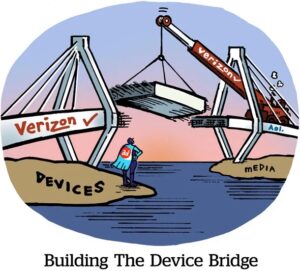Here’s today’s AdExchanger.com news round-up… Want it by email? Sign up here.
Back To The Scoreboard
Ad tech is revisiting panels. In some cases, that also means revisiting Nielsen.
Amazon Prime, which has exclusive airing rights to the NFL’s “Thursday Night Football,” signed a three-year deal with Nielsen on Tuesday to do audience measurement for the games starting in September.
It’ll be the first time the century-old panel titan will include ratings from a streaming service in its weekly television-viewing report, WSJ reports.
The partnership with Amazon is a pretty big win for Nielsen, considering the TV industry just spent the last year courting its competitors.
“This is a huge testament to the role of our ratings in the media ecosystem,” said Deirdre Thomas, who manages Nielsen’s US audience measurement product sales.
The panel scene has been heating up recently. Last week, the Video Advertising Bureau announced plans for a panel to directly compete with Nielsen.
But panel-mania goes beyond television. Panels can boost cross-media measurement and attribution using aggregated data to feed machine-learning models. Google, for example, just launched an online panel of its own to help validate the models it uses to estimate online conversions across its measurement products.
Freedom Ain’t Free (Or Is It?)
It’s a classic scam: Private companies charging unsuspecting customers high rates for services they can get from the government for free.
And Google is often an unwitting accomplice, because scammers can purchase Google Search ads so their services appear in search results before links to actual government websites.
Say you’re searching for an employer ID number (EIN). The IRS provides EINs for free. But according to a 2021 investigation by The Markup, if you Google “find EIN,” you may be served search ads for a company with “.gov” in its URL that charges $250 for EINs. Such ads violate Google’s policies yet continue to be served to unsuspecting people.
Now the federal government is taking notice of scammers profiting from its free services. In a letter to Alphabet CEO Sundar Pichai, US Senator Richard Blumenthal called out Google for failing to crack down on these scammers – and the problem isn’t going away.
The same keywords identified by The Markup last year are still returning fraudulent ads.
Blumenthal is demanding that Google announce changes to prevent scammy search ads from being served to customers by September 2. Google has promised a “full response” (whatever that means).
[For more from The Markup, check out our recent AdExchanger Talks episode with CEO Nabiha Syed.]
You, Me And The FTC
The Federal Trade Commission shared plans to expand online privacy protections just last week – and it’s already getting sued for the effort.
Idaho-based attribution platform Kochava sued the FTC before the federal agency could follow through on its threat to sue the platform for marketing location data based on consumer visits to “sensitive locations,” specifically abortion clinics, WSJ reports.
It’s clear why Kochava wanted to take preemptive action: Scrutiny on data collection practices is only going to get more intense following the recent overturn of Roe v. Wade. This, paired with a general ramp up of privacy regulations across the US and around the world, means any company processing geolocation data should be particularly careful right now.
Just last week, Kochava announced a “Privacy Block” feature that excludes any health services location data from its marketplace. Because Kochava is committing to exclude this type of data, it claims the FTC has no grounds to sue (despite the FTC proposing its complaint even before Kochava launched “Privacy Block”).
Guess it’s one of those he-sued, she-sued situations.
But Wait, There’s More!
Tremor International reported $39.1 million in Q2, falling short of its $40 million guidance. [MarketWatch]
Amazon accuses the FTC of harassing CEO Jeff Bezos and other top execs as part of its investigation into whether Amazon uses dark patterns to lure people into signing up for Prime. [FT]
Report: Ad-supported content accounts for 60% of the time US audiences spend consuming entertainment. [Variety]
Libsyn is set to acquire German podcasting platform Julep Media. [Benzinga]
Shopify Collabs lets content creators post affiliate links from Shopify merchants in their bios. [TechCrunch]
TikTok influencers pledge to boycott Amazon until it meets the Amazon Labor Union’s demands. [Washington Post]
Travel brands are spending more on advertising despite recession concerns. [Marketing Brew]
You’re Hired!
WPP agency Wunderman Thompson taps Tom Murphy as its new chief creative officer for North America. [Ad Age]











